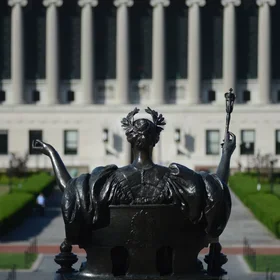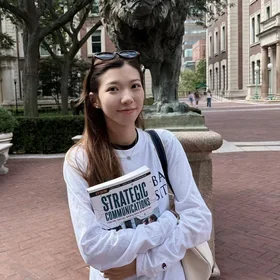The Negotiation and Conflict Resolution (NECR) program at Columbia University School of Professional Studies encourages and supports student participation in professional conferences around the world.
Two NECR students recently had the opportunity to represent the program at events hosted by the Schranner Negotiation Institute. Below they share how these prestigious events provided a valuable platform to put their classroom learning in negotiation into practice, engage in professional networking, and develop their skills alongside the world's leading negotiators.
Nataliya Donchenko, Candidate for M.S. in Negotiation and Conflict Resolution
Attended Negotiation Conference Hosted by the Schranner Negotiation Institute in Zurich
One of my conference highlights was meeting and talking with leading researchers in the field of negotiations like Daniel Shapiro and Erin Meyer. Having used their research and theories extensively in my Columbia papers, it was thrilling to not only hear them speak about their work but also to connect with them personally. They proved to be not just great and innovative researchers, but also amazing presenters with a wonderful sense of humor.
The NECR program at Columbia University has taught me information and knowledge unavailable anywhere else in the world and has exceeded all my expectations. It evolved my mindset and how I process information, sharpening my ability to read between the lines and understand the true dynamics of the world beneath what is publicly visible. A crucial aspect of my experience has been deepening my expertise in a field often underestimated: the psychological and behavioral dimensions of human interaction. I learned disciplines like interpersonal dynamics, behavioral science, strategic communications, and others, to understand how emotions and subconscious drivers shape decisions. Most importantly, I learned how to apply these principles to influence negotiations effectively.
This experience has allowed me to connect with and befriend a remarkable group of individuals, including esteemed leaders in the field of negotiation.

NECR student Nataliya Donchenko with one of the speakers at the Zurich conference, Professor Klaus Lassert from the University of St. Gallen.
Theodore DeLeeuw, Candidate for M.S. in Negotiation and Conflict Resolution
Attended the Schranner Negotiation Institute Master Class in New York City
The masterclass led by Matthias Schranner, founder of the Schranner Negotiation Institute, offered a comprehensive, high-stakes negotiation framework, targeting leaders from diverse sectors such as business, law, and human resources. Schranner, a seasoned crisis negotiator, introduced his four-part model—Preparation, Opening, Leadership, and Deadlock—which focuses on negotiations involving both rational and emotional parties.
An increasing number of people understand the importance of preparation. However, strategy and tactics during the negotiation are often overlooked and must be also considered, rehearsed, and reviewed. Most people put all of their effort into what they will negotiate and little to no effort into how they will negotiate. Schranner advocates for the inverse.
It’s important to remember that negotiations are a process, not a debate. Good negotiators are good listeners and respect is crucial—disrespect will kill a negotiation faster than anything else. On the other hand, Schranner suggests that if you are on the receiving end of disrespect, you should aim to ignore it and move on in order to achieve your goal.
There were many more key points from the class, but one valuable takeaway is to never underestimate the disarming power of saying thank you, particularly after receiving a difficult request (“Thank you for the opportunity to discuss … ”).
About the Program
Columbia University’s Master of Science in Negotiation and Conflict Resolution prepares students to analyze the root causes and dynamics of conflict and to transform disputes through reasoned and resourceful interventions. The program focuses on developing self-awareness, tenacity, and interpersonal competency; building common ground; opening lines of communication; ensuring representation and recognition; and building sustainable possibilities for resolution.
The fall 2025 application final deadline for the M.S. in Negotiation and Conflict Resolution program is May 1. Learn more here.



